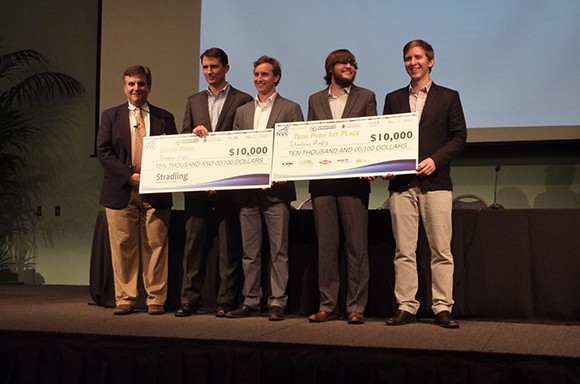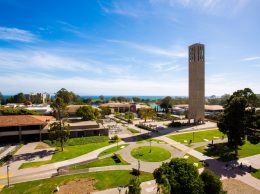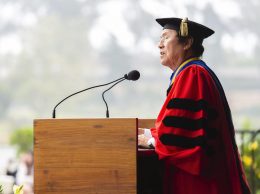
ShadowMaps took home $20,000 in prize money at UC Santa Barbara’s annual New Venture Competition. The startup makes a service that tries to build three-dimensional maps of the shadows cast by buildings and correct for them to improve mobile phone GPS. (Stephen Nellis / Business Times photo)
A technology to make mobile phone GPS more accurate, a new seafood distribution system and a novel way to brand beer growlers at craft breweries were among the top winners at UC Santa Barbara’s annual New Venture Competition on May 22.
Six teams vied for cash and free professional services in the competition, which has been around for more than a decade and has spawned South Coast companies such as Inogen, Next Energy Technologies, Phone Halo and others. It served as an early blueprint for business contests that have taken root at nearly every four-year university and city college in the region.
This year’s biggest winner was ShadowMaps, which took home the $20,000 in total prize money. The team tackles a problem with location-based services in big cities. Tall buildings can block GPS satellite signals and confuse phones, throwing off location readings by hundreds of feet. That makes it difficult to achieve what the team calls “storefront accuracy” — that is, to send a customer a coupon or offer that will effectively guide them right to a storefront.
“It’s called the shadow effect. Tall buildings cast shadows that block GPS signals,” said team member Dayton Horvath. “With knowledge of where the buildings are, where the satellites are and where the phones are, we can improve this by a factor of 10.”
Nearly all smart phones are gathering location data that details the relative strength of all the GPS satellites they can see. By crunching that data along with some other mapping data, ShadowMaps can build three-dimensional maps of the shadows cast by buildings and correct for them — all with software updates, rather than hardware. “The largest market is location-targeted advertising. Agencies are going to be demanding more accurate location information from the ad networks,” Horvath said.
Bottle Branders, which took home $5,000, is tapping the booming craft beery industry, which is worth tens of billions of dollars and has grown at a double-digit clip for a decade. “Consumers are moving to higher-quality products at smaller labels,” said Max Ludington.
The industry’s big problem is that it still relies on half-gallon jugs called growlers to send beer home with customers. Growlers, with their screw on caps and screen-printed labels, let the beer go flat and don’t leave room for the carefully crafted branding that beer makers build around their various brews.
Bottle Branders makes a magnetic label system that lets breweries easily swap out branding, along with a “growler tap” that uses carbon dioxide canisters to keep the beer bubbly. The goal is to make the steel-plated growlers industry standard, making the magnetic labels an art form of their own, perfect for sticking on the refrigerator once the growler is empty. “That’s prime marketing space,” Ludington said.
Salty Girl Seafood took home $10,000 with its concept for a transparent online market place where fisherman can sell their catch directly to chefs, eliminating the mislabeling and sustainability problems that plague the industry. “If you don’t know where your seafood was caught, you don’t know how fresh it is,” said Norah Eddy.
Cayuga Biotech pitched what it hoped will be a commercially viable nanotech drug to treat both internal and external bleeding. The company envisions its drug as a “universal hemostat able to generate clots in all bleeding cases.” The judges praised the potentially broad reach of the treatment, but grilled the team on the potential difficulty of getting approved by federal regulators. The team said that it had solid advisers ready to help but didn’t downplay the challenge. “The drug discovery is long and there are risks,” said team member Damien Kudela.
Fluency Lighting Technologies plans to use laser diodes beamed through a phosphorous-coated lens to compete against the high-energy LED lighting used in stadiums and other outdoor applications. The company said its lights would save about $475 a year compared to a traditional light, compared with the $285 saved by LED lights. In the question and answer session, the judge brought up the issue of color — consumers are lamenting the harsh, bluish light put out by home-use LED lights. “People don’t care as much about the color quality of outdoor lights,” said team member Jared Hulme. But, said team member Kristin Denault, Fluency will be able to tune the color of the lights as laser diodes come down in price.
Also taking home prize money was Echo, a smartphone and web application that allows customers to order and pay in a restaurant over Bluetooth.






 Print
Print Email
Email
















